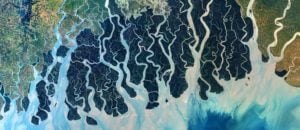The right to water should be as fundamental as the right to food, and India’s waterman Rajendra Singh wants all political parties to promise a law to this effect. The man who won the Magsaysay Award – known as Asia’s Nobel Prize – in 2001 for regenerating seven rivers in a semi-arid part of India’s desert state Rajasthan has now teamed up with activists around the country to push a water security bill drafted by them.
The plan is to push the bill as a promise by all political parties, which are now preparing their manifestos for elections to India’s parliament. Polls are expected in April or May. The activists’ case has been strengthened because the outgoing government has passed a Food Security Act that guarantees a minimum amount of food to every Indian.
“Along the same lines, it must be enshrined in law that every Indian has the right to get the basic minimum amount of water,” Rajendra Singh told thethirdpole.net. The draft bill does not specify what this amount should be. “There are various definitions of what the basic minimum requirement may be. We did not want to get into that. But, if you ask me, we should work on the basis of the WHO definition,” said Sanjay Singh, a water rights activist who has teamed up with Rajendra Singh to form Jal-Jan-Jodo Abhiyan, a civil society platform to push the bill.
The World Health Organization (WHO) says, “A minimum of 7.5 litres per capita per day will meet the requirements of most people under most conditions…a higher quantity of about 20 litres per capita per day should be assured to take care of basic hygiene needs and basic food hygiene.”
Silence on transboundary rivers
The draft bill emphasises the need to conserve water bodies and give prime importance to women when it comes to essential water needs. However, it is silent on the three transboundary river basins that are among the largest basins in India – Ganga, Brahmaputra and Indus.
Asked to explain this omission, Rajendra Singh said, “You are right, these basins are very important, and the issue of transboundary water sharing is crucial. But it is such a divisive issue that we did not want to include it at this stage. We don’t want to scare all political parties away. But I assure you that we’ll take this up later.”
Another crucial issue on which the draft bill is silent is disputes between various Indian states over water sharing. In some cases – Karnataka versus Tamil Nadu over the Cauvery and Punjab versus Haryana over the Sutlej-Yamuna link canal, for example – these disputes have been going on for decades, despite repeated attempts by the central government and India’s apex court to resolve them.
Part of the reason is that water is a subject under the purview of state governments as per the Indian Constitution, but inter-state and international water issues are supposed to be handled by the central government. Asked why the bill did not talk about this crucial issue, Sanjay Singh said, “We’re not going to get anywhere if we ask for amendments to the Constitution at this stage. Let us get the basic minimum water right guaranteed by law, and then we’ll take up these contentious issues.”
One contentious issue that the bill has taken up – though briefly – is groundwater. India is the world’s largest groundwater user, and water tables are falling dangerously fast almost all over the country, especially in the hard rock Deccan Plateau that covers much of central and southern India and where aquifers take thousands of years to be filled. India has no overall law to regulate groundwater usage, so anyone who owns a piece of land is free to tap the aquifer beneath. The Central Groundwater Board keeps preparing maps to show how dire the situation is and often tells state governments to stop pumping from critically imperilled aquifers. The implementation of such arbitrary rules is generally poor.
The activists’ draft bill responds to this situation by suggesting, “No person may undertake any activity that can result in or be deemed as aquifer interference activity.”
The bill is also silent on whether the use of water beyond the basic minimum should be priced, though Rajendra Singh was very clear that households and farmers should not be asked to pay for water. In this regard, he was very critical of the government’s 2012 National Water Policy. “It says in its preamble that water is a fundamental right, then it goes on to suggest that water should be priced,” Rajendra Singh said. “I told Harish Rawat (then the minister for water resources) he must get this changed, that water must not be priced. He is a man originally from the socialist movement. How could he have done this? But they did not change.”
Overall, the draft bill seeks to move control over water to Panchayats (village councils) and municipalities and away from state and central governments. “The local elected bodies are the organisations where people know what is going on, and water can be conserved and sustainably used only if we empower them,” Sanjay Singh said.
The draft says, “The Panchayat may have all such powers to ensure the biological, ecological and hydrological integrity of the water body.” It also says that if necessary, local authorities may form “River Panchayats” or “Area Sabhas” (meetings) dedicated to this purpose.
The bill says every local authority must publish maps of water bodies under their jurisdiction within four months of the passage of the act, and then maintain records and protect these water bodies. This can mean major change, because many water bodies are encroached upon by local strongmen while many more are polluted.
The draft says that all “prohibited activities” that may endanger a water body “shall be cognizable offences chargeable with the maximum penalties under the relevant IPC (Indian Penal Code).” Failure of local authorities to carry out their obligations under this law shall also be deemed an offence.
The activists are planning to hold a meeting with Members of Parliament across all parties to push their case before taking the draft bill to individual parties and asking them to promise in their manifestos that they will enact this law if they are elected.



